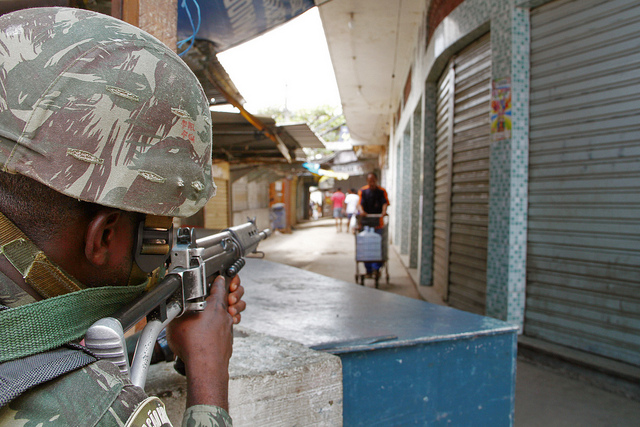
With all of the positive news coming out of Sao Paulo’s stock exchange and the ministries of Brasilia recently, this weekend’s crackdown on organized crime in the Complexo de Alemão and Vila do Cruzeiro favelas reminded the world of the crime-ridden Rio de Janeiro of today, whose parallels can easily be found throughout many of the country’s urban areas.
On Thursday November 24th Rio’s police force, Special Police Operations Battalion (or BOPE) and the military participated in a weekend-long raid on the headquarters of the Amigos dos Amigos and Comando Vermelho gangs. The operation involved over 2,700 police officers and soldiers and resulted in the capture of 30+ criminals, the confiscation of drug and weapon caches, and the deaths of over 40 gang members and civilians (For a detailed account of the assault, see Rio-based blogger Julia Michaels’ posts found here, here, here, and here).
The operation against the Vila do Cruzeiro and Complexo de Alemão favelas follows a series of acts of arson and hijacking by organized crime groups in retaliation to the government’s gradual takeover of the city’s slums. The recent crackdown is intended to rid the city of criminal gangs ahead of the 2016 Olympics and 2014 World Cup. Since this weekend’s violence the government has installed benignly-named “Pacifying Police Units”, or UPPs, in the city’s re-conquered favelas to maintain order and flesh out any remaining criminal elements.
Remaning Challenges
While this weekend’s operation has been met with support from Rio’s residents and much progress has been made be federal government in reducing national crime, many of the leading causes behind Brazil’s insecurity continue to linger.
Brazil’s homicide rate is still four times larger than the United States (one of the highest in the world) and the divide between wealth gap between the rich and the poor remains on par with that of Bolivia and Haiti.
Brazil’s high crime rates are also compounded by lax gun regulation and rampant corruption in the city’s police force and government. Unbeknownst to many, Brazil is the second-largest producer of small arms in the Western Hemisphere, providing Brazil’s gangs with a direct source for weapons.
The Brazilian government has been at war with organized crime groups since the 1980’s and has conducted dozens of operations on par to this weekend’s throughout the past three decades. The supposed difference between this weekend’s incursions into gang territory and those of before is that this time Brazil’s armed forces are here to stay (or at least until summer of 2011).
This weekend’s heroics aside, Rio’s favelas are continuously sprawling and organized crime will continue to form part of the city’s economic and political life. The city’s gangs have been weakened but not eliminated. They will re-organize, re-establish territories, and continue to threaten the Brazil’s ascent as a regional and global power unless additional steps are taken and the origins of Brazil’s insecurity are dealt with.
Photo by flickr user Luis Baltar